Key takeaways:
- Pro-life advocacy focuses on the inherent value of all human life and encourages community support and understanding beyond just opposing abortion.
- Community events create safe spaces for dialogue and shared experiences, fostering empathy and connection among participants.
- Effective event planning involves a clear purpose, suitable venues, and proactive promotion through social media and local networks.
- Engaging local stakeholders and gathering feedback post-events enhance credibility, community ties, and future event success.
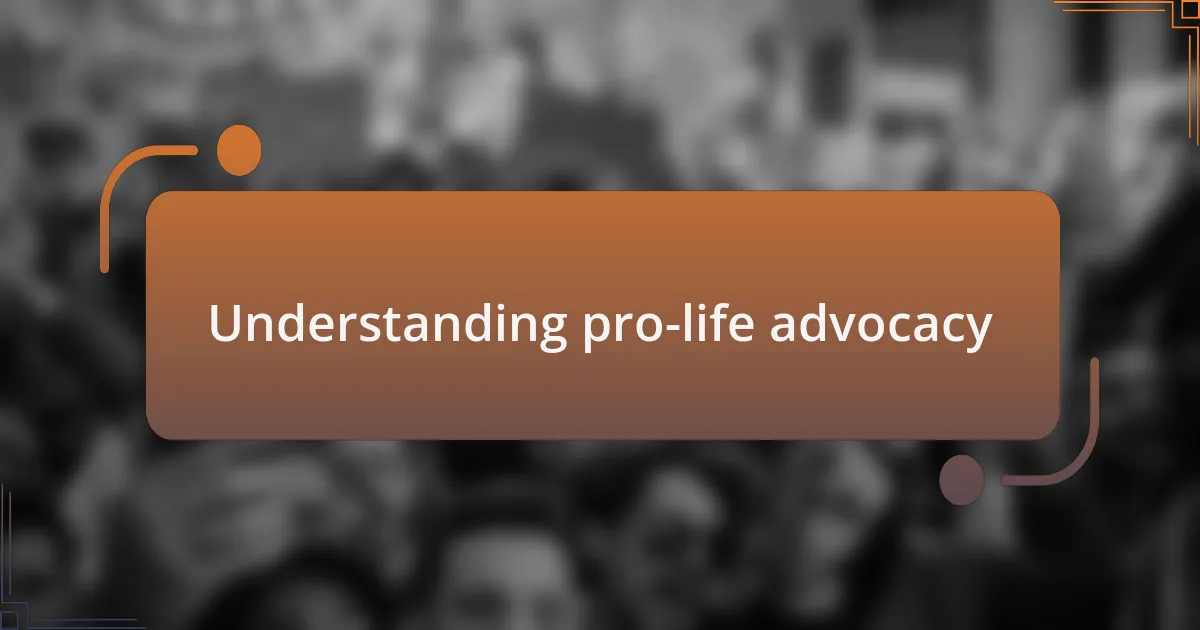
Understanding pro-life advocacy
Pro-life advocacy centers on the belief in the inherent value of all human life, particularly the lives of unborn children. I often find myself reflecting on moments where I’ve seen that value manifest in community discussions—like when a local group shared powerful stories of families affected by unplanned pregnancies. These narratives struck me deeply, underscoring the idea that every life has potential and that every choice carries weight.
When I participate in rallies or discussions, I notice the passion that emerges from diverse voices. Each person shares their reasons for supporting pro-life initiatives, creating a tapestry of emotions. Isn’t it fascinating how a single shared belief can unite people from various backgrounds? It reminds me that at its core, pro-life advocacy isn’t just about opposing abortion; it’s about fostering an environment of love, support, and understanding for every life journey.
Ultimately, understanding pro-life advocacy means acknowledging both sides of the conversation while firmly standing on the belief that every life deserves a chance. I’ve seen firsthand how nurturing relationships within the community can shift perspectives, opening up dialogue that transcends mere opinion. Isn’t that what truly drives meaningful change?
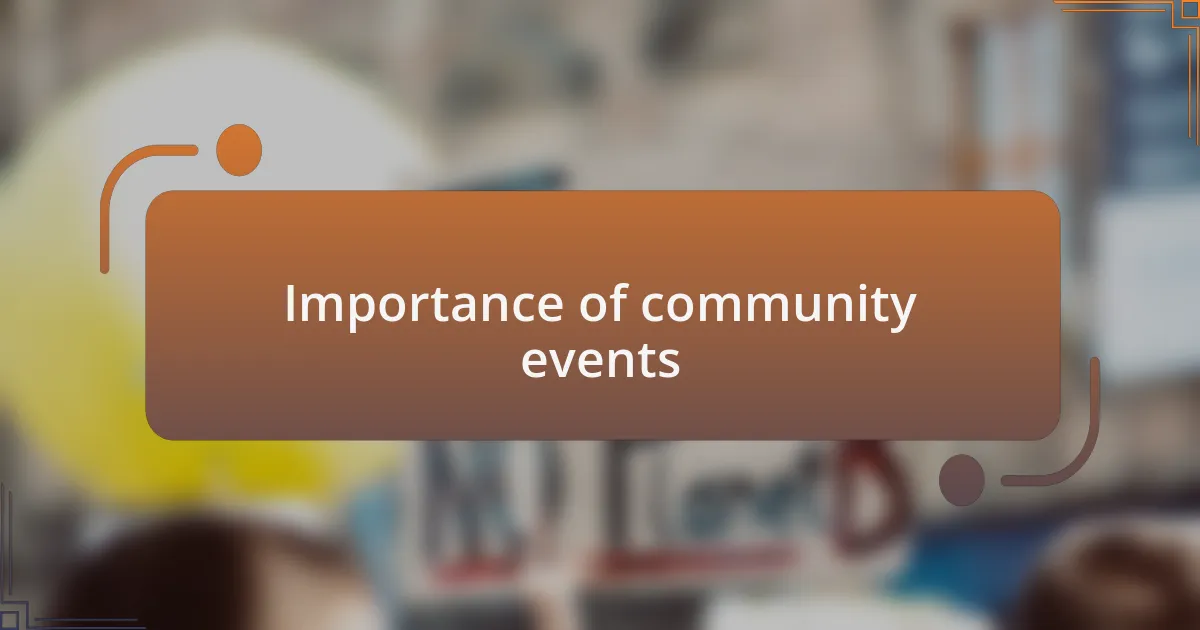
Importance of community events
Community events play a crucial role in solidifying the pro-life movement. I remember organizing a local fundraiser, where everyone brought stories and experiences that illustrated the significance of each life. Witnessing attendees connect over shared struggles and triumphs was profoundly moving, and it deepened my understanding of how collective experiences can drive impactful change.
These gatherings do more than just raise awareness; they create a safe space for dialogue. For instance, during a panel discussion I attended, panelists courageously shared their personal journeys related to motherhood and choice. Imagine how such openness fosters empathy—how it can transform misunderstandings into meaningful conversations. Isn’t it incredible how a simple gathering can be a catalyst for healing and education?
When I see friends rallying together for a community event, I can’t help but appreciate the ripple effect of those efforts. Each interaction, each shared story, builds a network of support that extends far beyond the event itself. It makes me think: How often do we miss opportunities to connect over issues that matter to us? These shared moments reinforce the idea that we’re not alone in this journey, and they empower us to advocate for the lives we believe are worth defending.
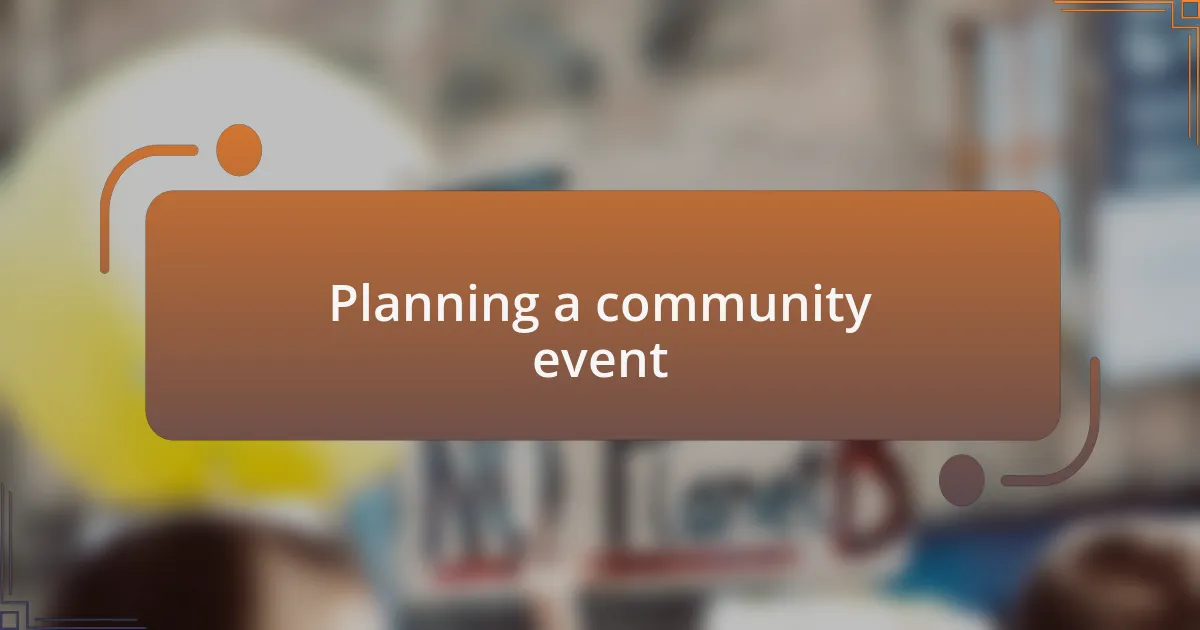
Planning a community event
When planning a community event, the first step is to define a clear purpose. I once organized a gathering aimed at discussing the impact of local policies on women’s health. Narrowing the focus helped me tailor activities and discussions that resonated with attendees, drawing in people who were passionate about creating change.
Next, selecting the right venue is critical. I remember hosting an event in a community center that was warm and inviting. The feedback from participants was overwhelmingly positive, as they appreciated the accessibility and comfort of the space. It’s fascinating how the right environment can create a sense of belonging and encourage open dialogue, isn’t it?
Finally, spreading the word is essential for a successful turnout. I utilized social media and local networks to get the word out, which made a significant difference. The sense of anticipation among participants grew as they shared their excitement, and it reminded me how vital it is to create buzz around an event. Engaging with the community beforehand can turn an ordinary gathering into a highly anticipated occasion.
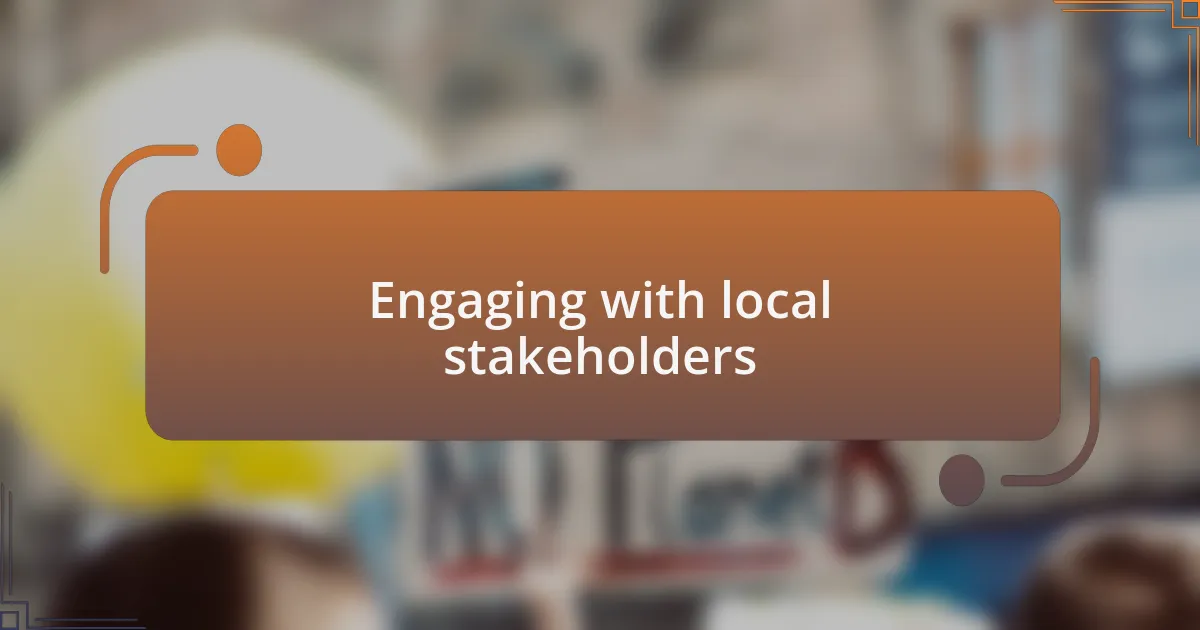
Engaging with local stakeholders
Building relationships with local stakeholders is a crucial aspect of organizing community events. I remember reaching out to local healthcare providers when I coordinated an educational panel on reproductive health. Their willingness to participate not only lent credibility to our event but also allowed us to provide valuable resources directly to attendees. Have you ever thought about how collaboration can enhance the impact of your initiatives?
In my experience, connecting with local businesses can also boost support for your cause. I partnered with a local café that donated refreshments for one of my events. This not only helped create a welcoming atmosphere but also encouraged attendees to engage with the café and build community ties. It’s always refreshing to see how such partnerships can foster goodwill and strengthen local networks.
Moreover, engaging with community leaders can open doors to new opportunities. During one event, I had the chance to speak with a local elected official who expressed interest in championing our cause. It made me realize that having influential allies can significantly amplify your message. Have you considered how your local leaders might be willing to support your advocacy efforts?
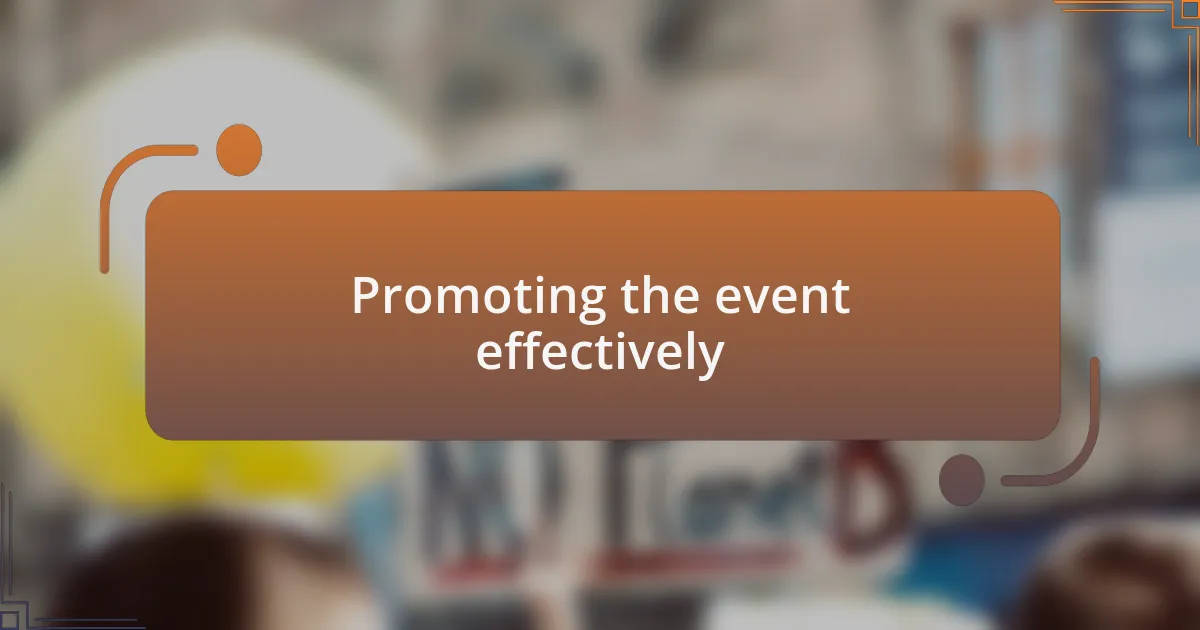
Promoting the event effectively
Promoting your event effectively requires a multi-faceted approach. I recall a time when I leveraged social media to generate excitement for a community rally. By creating a series of visually appealing posts and sharing impactful stories, I managed to reach a wider audience than I initially expected. Have you ever thought about how the right imagery can draw people in and inspire them to take action?
Another powerful strategy is to tap into existing networks. I reached out to local faith groups, and their support increased our event’s visibility tremendously. Seeing members of these communities rally together around a shared cause was incredibly uplifting. It really made me feel that when people unite for a purpose, their collective energy can spark real change. Why not think of groups in your area that could benefit from collaborating on your events?
Lastly, remember the importance of follow-up. After an event I organized, I made a point to thank attendees through heartfelt emails and engaged them with updates on our initiatives. This made them feel valued and connected, which fostered a sense of belonging and loyalty. Have you considered how maintaining this connection could encourage participants to advocate further for your cause?
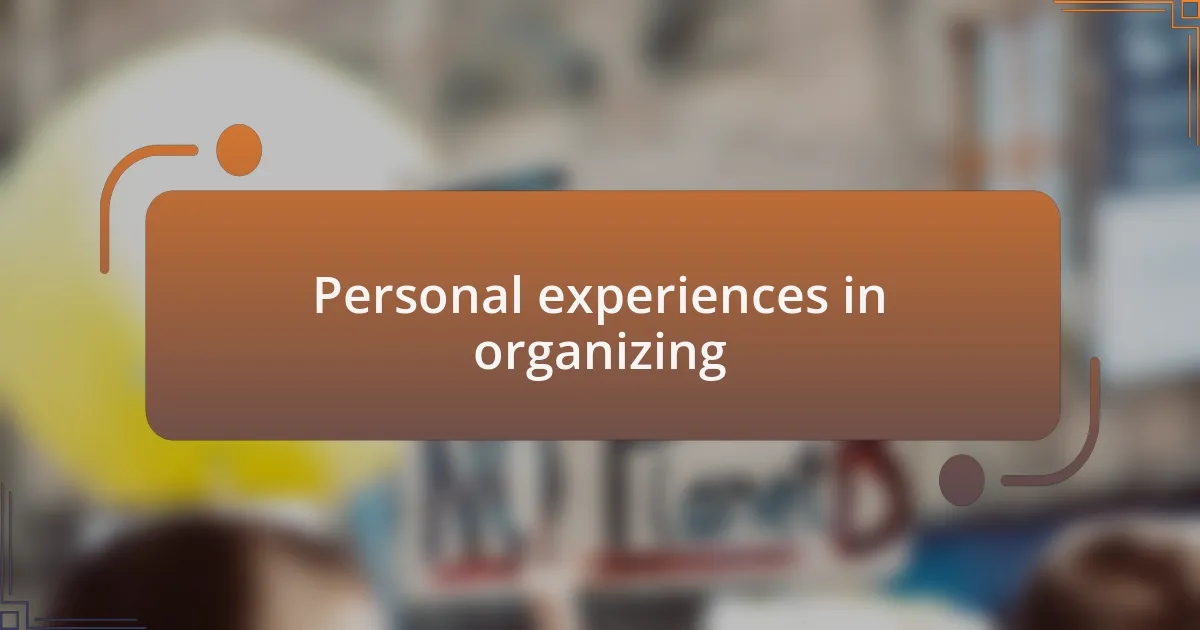
Personal experiences in organizing
Organizing community events has been a journey filled with both challenges and rewards. One specific instance that stands out for me was when I coordinated a local workshop focused on pro-life education. As I watched the room fill with passionate individuals eager to learn and share their perspectives, I felt a profound sense of purpose. It reminded me how vital it is to create spaces where open dialogue can flourish. Have you ever felt that electric atmosphere when like-minded people gather for a cause?
Another memorable experience was navigating the logistical hurdles for a fundraising dinner. I vividly recall one evening when the caterer canceled unexpectedly just days before the event. Thankfully, I managed to rally support from local businesses, and what could have been a disaster turned into an opportunity for community collaboration. The outpouring of generosity showed me that resilience is often bolstered by community spirit. How do you think local partnerships can enhance the success of your events?
Lastly, I cherish the moments during these gatherings when attendees share their personal stories. At one event, a young woman courageously spoke about her journey and the impact of our advocacy on her life. Witnessing the audience’s emotional connection reminded me of the importance of these narratives in driving our mission forward. Have you considered how sharing personal experiences can turn an event into a powerful movement?
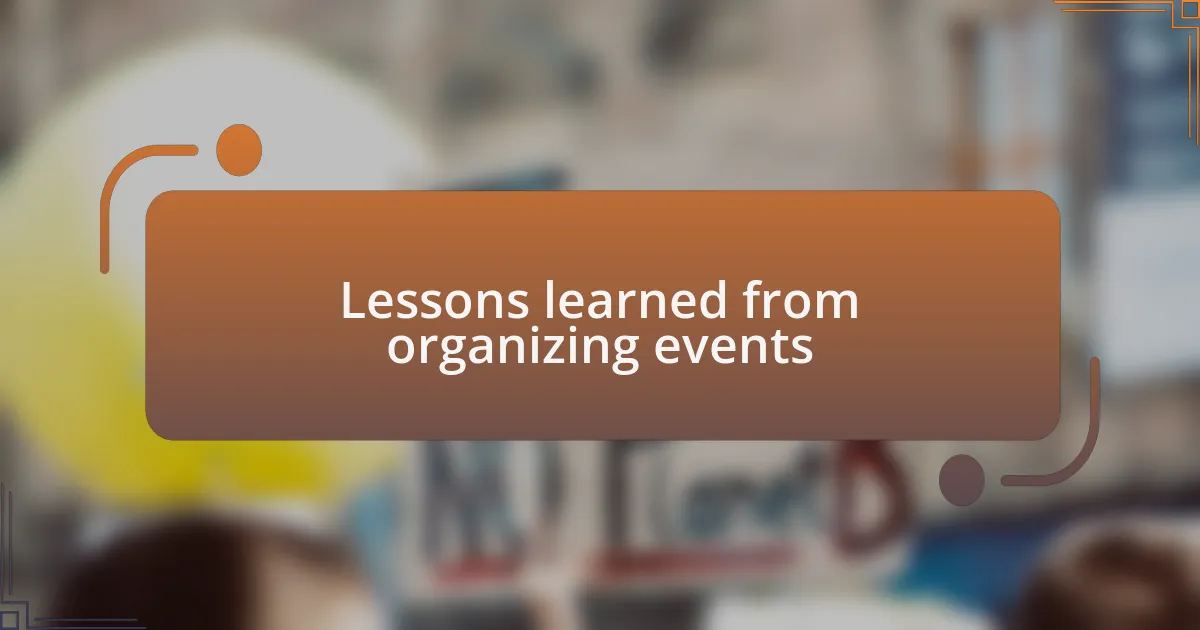
Lessons learned from organizing events
One valuable lesson I’ve learned is the significance of thorough planning. During one of my earlier events, I underestimated how much time it would take to coordinate volunteers. I found myself scrambling on the day of the event as I realized some tasks had been overlooked. This experience taught me that the more detailed the plan, the smoother the event runs. Have you ever found yourself overwhelmed by unexpected surprises at an event?
Another insight centers around the power of engagement. I vividly remember an event where we incorporated interactive elements, such as Q&A sessions between speakers and attendees. The atmosphere shifted dramatically; people felt empowered to voice their thoughts and ask questions. This hands-on approach not only enriched the experience but also fostered a stronger sense of community. How do you engage your audience to make them feel included in the conversation?
Lastly, I’ve come to understand the importance of feedback. After each event, I would follow up with participants to gather their thoughts on what worked and what didn’t. This practice not only made attendees feel valued but also helped me improve future events. It’s fascinating how listening to others can provide fresh insights that lead to better outcomes. Have you considered how constructive criticism can be a catalyst for growth in your organizing efforts?